
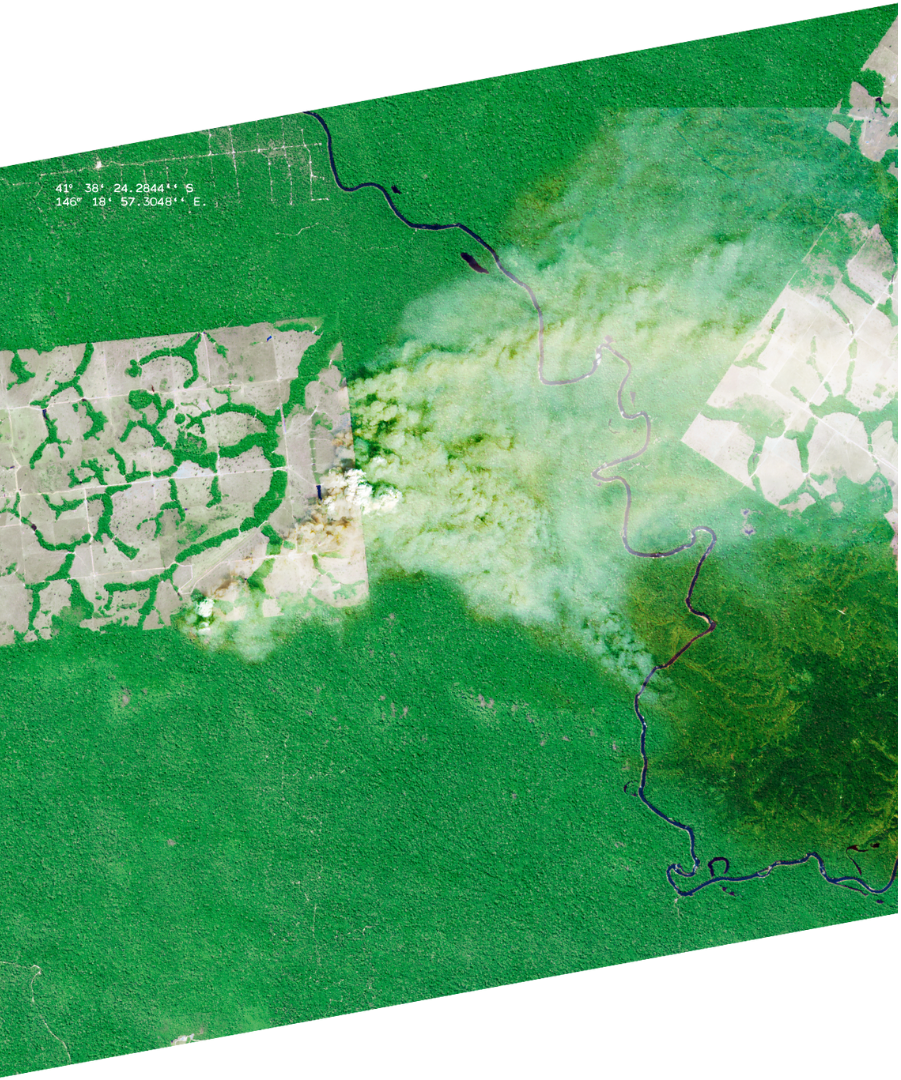




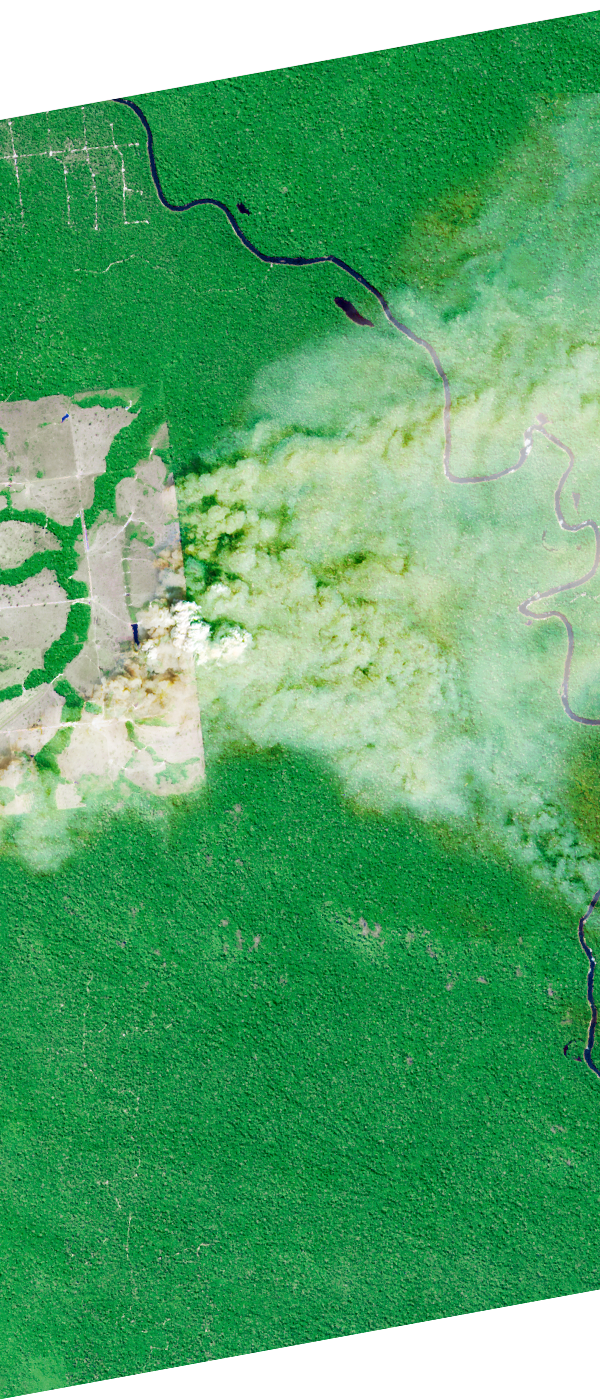

Public, government and business concern about global deforestation and biodiversity loss is sparking a growing wave of initiatives from the private sector. But are companies in Australia doing enough to protect forests?
The Wilderness Society has conducted a benchmark to understand how companies associated with deforestation risk commodities in Australia are addressing the issue. The focus is on the supply chains for commodities linked to deforestation1 in the country: timber, pulp and paper, beef and leather as well as bauxite. We assessed influential companies within these commodities on their publicly available policies and plans to address deforestation.
See the Deforestation Benchmark Overview for more information on the purpose of the assessment, the impact the production of these commodities is having on forests in Australia, as well as the benchmarking methodology.
1. Including the deforestation, degradation or conversion of primary forests, remnant forest, HCV and HCS areas as well as the conversion of natural ecosystems.
This document expresses the opinions of Wilderness Society Limited. It is based on each company’s publicly available policies and other relevant documents that were known and available to the authors as of 31 August 2023. This document does not give financial or legal advice.

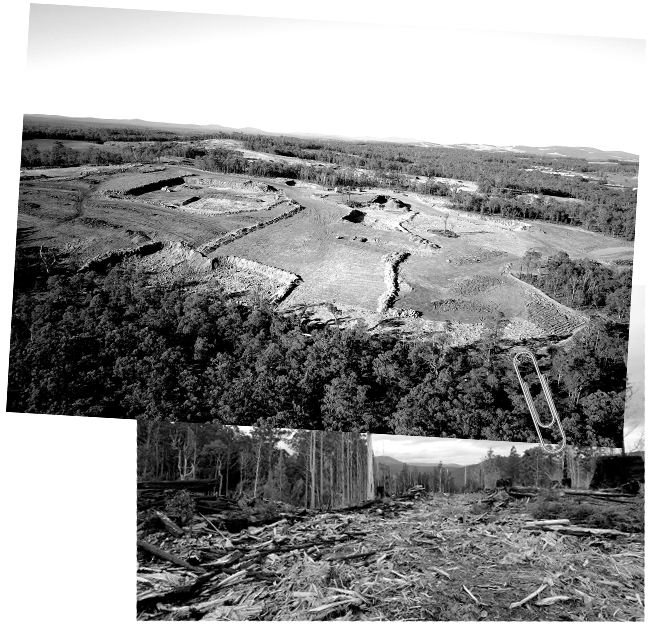
The benchmark found that only a very small proportion of the companies assessed currently have sufficient policies and procedures in place to rule out deforestation from their supply chains.
Corporate policies and commitments vary greatly among the roughly three dozen companies assessed in the benchmark. While some of these companies make no mention of the issue of deforestation, others have detailed public plans to ensure none of their activities result in deforestation
The first release revealed “those who attempt”: the seven companies that have scored highest in the benchmark. Publicly available information indicates that these companies have made some public commitments to eliminate deforestation from their supply chains, and have public plans and implementation tools, but don’t do enough to ensure they adequately verify their supply chains in Australia.
The second release revealed “those who disguise”: five companies that have general commitments on deforestation, but almost no information about how, when and where these commitments will be actioned. They offer little to no transparency on what they are doing, if anything, to begin to trace and verify their supply chains in Australia.
The third bulletin revealed “those who avoid”: seven companies that express some concerns about biodiversity and forests, but fail to sufficiently address their own responsibility.
This fourth release reveals “those who say nothing”: companies that deny or ignore Australia’s deforestation crisis and their responsibility to address this risk in their supply chains. These companies appear to show little to no concerns about deforestation and their potential involvement in it, despite operating in supply chains of commodities associated with deforestation in Australia.
Introducing "those who say nothing"
Australian Sustainable Hardwoods is an Australian hardwood timber mill and manufacturer. It has been assessed for its timber products supply chain.
Carpet Court is a floor covering retailer. It has been assessed for its timber products supply chain.
Detmold Group is a packaging products manufacturer whose brands include Detpak and Paperpak. It has been assessed for its pulp and paper supply chain.
Harvey Norman is a retailer with over 190 stores in Australia which offers, among other products, furniture and flooring. It has been assessed for its pulp and paper and timber supply chains.
Hungry Jack’s is the Australian franchise of the Burger King Corporation with over 440 restaurants in the country. It has been assessed for its pulp and paper and beef cattle supply chains.
Strandbags is an Australian retailer of bags and travel items with over 300 stores in Australia and New Zealand. It has been assessed for its leather supply chain as a byproduct of beef.
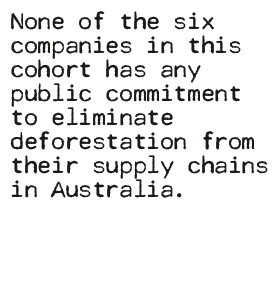
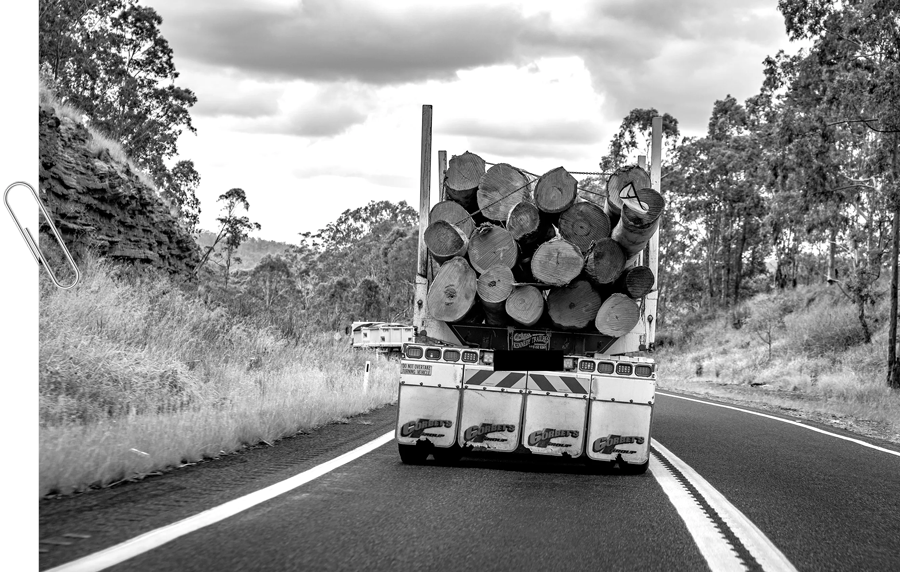
Ranking
The benchmark separates the general policy and commitments from the commodity-specific plans and information on their implementation (read the full methodology in the overview). All companies have a combined score across their general and commodity-specific commitments.
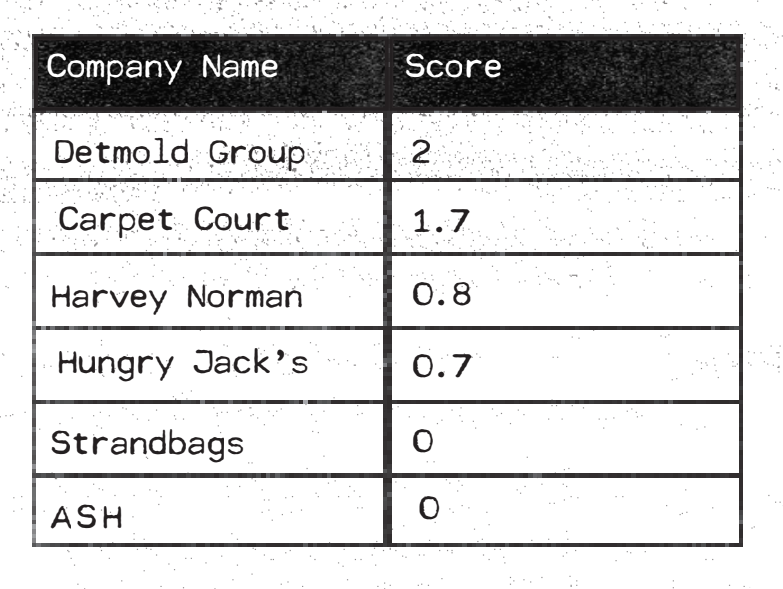
See Annex 1 - cohort scoring comparison
Scoring data is available upon request at [email protected]
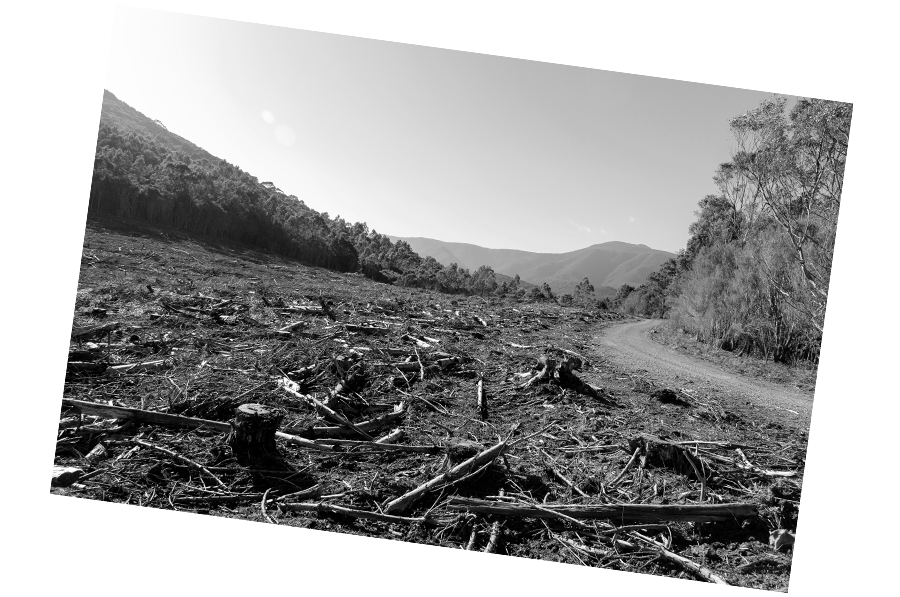
Insights and how to improve
The companies in this cohort stand out from the rest of the companies scored in The Uncovered benchmark because of the sheer absence of commitments and policies to protect forests, despite their operations in exposed supply chains in a country that is a global deforestation hotspot.
None of the six companies in this cohort has any public commitment to eliminate deforestation from their supply chains in Australia.
Publicly available information shows no mention of:
public support for legislation to protect forests;
membership of voluntary initiatives;
commodity-specific tools such as implementation plans, supply chain monitoring systems; or
supply chain transparency from these companies.
Strikingly, only one company within this cohort of six even publicly recognises the need to protect forests. Two companies in the cohort, out of the five either operating in pulp and paper or timber supply chains, sourced credibly certified products. And, one of the companies did have limited information available about supply chain traceability.
These companies are way off international best practice on zero-deforestation commitments. Even worse, they are far from what would be the bare minimum for any company that has deforestation and biodiversity risk in their supply chains in the 21st century - i.e. recognising the issue of deforestation and their corporate responsibility to address it.
At the time of the assessment, none of these companies can credibly demonstrate the absence of deforestation in their supply chains. They urgently need to face the real risk that deforestation could be occurring in their supply chains, acknowledge the issue publicly and make plans to monitor their activities and to mitigate this risk using international best practice commitments and tools to track their progress towards these commitments.
Analysis of individual scores
Detmold Group has scored 2 / 100. The company does not have any group-wide commitment to protect forests. Instead, it states that it only uses “paper and board from large, reputable raw material suppliers, which means no old growth forests are used”.2 No information was found about how this is verified. Detmold does state that it can “trace the fibre in the final package right back to its source in nature”. Overall there was a lack of transparency about whether and how the company monitors its supply chain for deforestation. Detmold Group should set a solid group-wide commitment to eliminate deforestation from its supply chains by 2025, and begin to set up systems to reach this goal.Carpet Court has obtained a score of 1.7 / 100. Publicly available information indicates that the company does offer FSC-certified products. However, no publicly available information was found on any of the other indicators, about any zero-deforestation commitments or policies. Carpet Court should set a commitment to eliminate deforestation from its timber products supply chain by 2025 and produce implementation plans to reach this target.
Harvey Norman has scored 0.8 / 100. Beyond the sale of some FSC Mix products, no other information was found on any commitments, tools or intentions to eliminate deforestation from their supply chains. Harvey Norman should recognise its responsibility to address the risk of deforestation and set best practice targets and implementation plans.
Hungry Jack’s has scored 0.7 / 100. It does recognise the issue of deforestation and responsible sourcing (the only company among this cohort), stating “We believe in responsible sourcing at all levels of our supply chain. Our commitment to responsible sourcing is demonstrated, in part, through our participation to improving animal welfare and working toward the elimination of deforestation.” Yet how this intention is actioned remains unclear: Hungry Jacks states it requires suppliers to provide reporting about the origins of products within their supply chain, and to participate in “initiatives and roundtables”. No further information was found about Hungry Jack’s’ commitments or policies to prevent deforestation. Hungry Jack’s should expand on its statement of intention by setting best practice commitments to eliminate deforestation from its beef and pulp and paper supply chains.Strandbags scored 0 / 100. No information was found about any statements, commitments or policies that the company might have to limit deforestation in their supply chain, or even on sustainability efforts. Strandbags should get up to speed with international best practice action to eliminate deforestation from its leather supply chain, set strong deforestation-free targets and demonstrate the absence of deforestation in its leather supply chain using monitoring and verification tools.
Australian Sustainable Hardwoods scored 0 / 100. No publicly available information was found about whether the company has any commitments or policies in place to prevent deforestation (including the deforestation, degradation or conversion of primary forests, remnant forest, HCV and HCS areas as well as the conversion of natural ecosystems), in its timber supply chain. Australian Sustainable Hardwoods should set a commitment in line with international best practice and follow through with information about implementation.2 Detmold Group Environment webpage. Accessed on 17/11/2023: https://www.detmoldgroup.com/e...
3 Hungry Jack’s Code of Business Ethics and Conduct for Suppliers. Accessed on 16/11/2023: https://www.hungryjacks.com.au...
Download Bulletin #4 pdf
This document expresses the opinions of Wilderness Society Limited. It is based on each company’s publicly available policies and other relevant documents that were known and available to the authors as of 31 August 2023. This document does not give financial or legal advice.
The Wilderness Society acknowledges First Peoples across the continent as the traditional custodians of Country, over which sovereignty was never ceded. We pay our respects to Elders and Ancestors who have cared for Country through millennia and acknowledge the unbroken connections to culture and Country which continue to endure today.